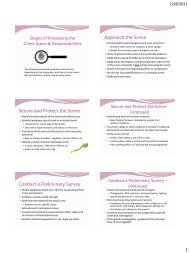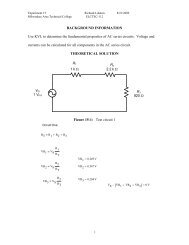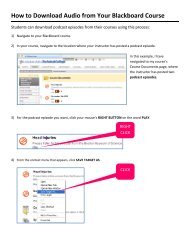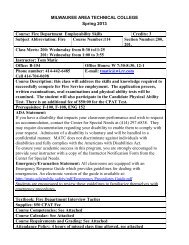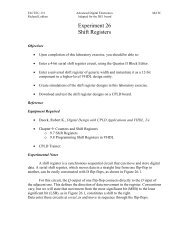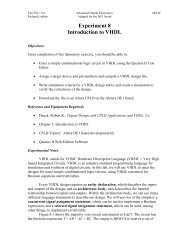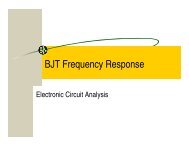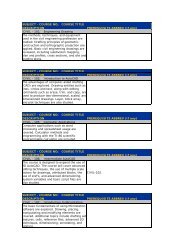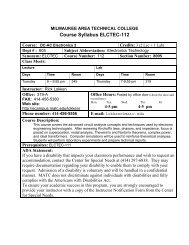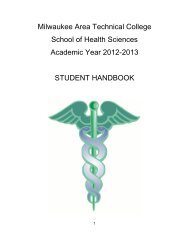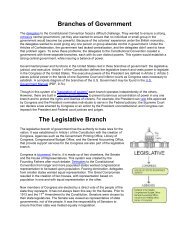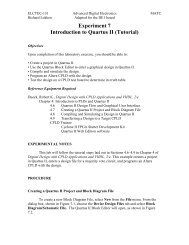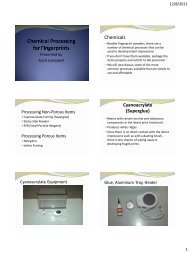WI Forward Award 2012 - Welcome to MATC - Milwaukee Area ...
WI Forward Award 2012 - Welcome to MATC - Milwaukee Area ...
WI Forward Award 2012 - Welcome to MATC - Milwaukee Area ...
You also want an ePaper? Increase the reach of your titles
YUMPU automatically turns print PDFs into web optimized ePapers that Google loves.
Leadership: Category 1<br />
the District Board meets with the president <strong>to</strong> discuss the<br />
evaluation in closed session. This evaluation is based upon the<br />
previously approved evaluation process. Specific procedures are<br />
then followed <strong>to</strong> develop and conduct the evaluation. College<br />
leaders utilize the performance review process <strong>to</strong> communicate<br />
progress made <strong>to</strong>ward achieving the college and departmental/<br />
divisional goals and <strong>to</strong> identify challenges that may need higher<br />
or broader college assistance. It is the duty of each member of<br />
the District Board <strong>to</strong> follow the District Board Member Code of<br />
Ethics and <strong>to</strong> comply with Wisconsin Statutes with respect <strong>to</strong> the<br />
proper and appropriate conduct of the office.<br />
1.2b LEGAL AND ETHICAL BEHAVIOR<br />
1.2.b(1) Legal and Regula<strong>to</strong>ry Behavior,<br />
and Accreditation<br />
To achieve our vision <strong>to</strong> “enrich, empower, and transform” lives<br />
in the community, <strong>MATC</strong> strives <strong>to</strong> set a high standard of ethical<br />
behavior that surpasses basic regula<strong>to</strong>ry requirements. Through<br />
the use of Advisory Committees, business and educational<br />
partnerships, and community board members, <strong>MATC</strong> addresses<br />
the impacts of the educational programs and services on our<br />
community. Open District Board meetings and “Listening and<br />
Learning” sessions welcome comments from the public. These<br />
venues bring public concerns and/or ideas about programming<br />
and services <strong>to</strong> the college leadership as they uphold the college<br />
value of Cus<strong>to</strong>mer Focus. The recent addition of Ensuring<br />
Sustainability <strong>to</strong> the college’s strategic goals, connected directly<br />
with the Sustainability and Facilities Core Committee, helps<br />
<strong>MATC</strong> conserve natural resources in a proactive manner.<br />
Similarly, the state regulations that guide <strong>MATC</strong>’s management<br />
of the supply chain, selection of vendors, evaluation of vendors,<br />
and termination of relationships with vendors creates a<br />
transparent system <strong>to</strong> ensure legal and ethical business practices.<br />
Although <strong>MATC</strong> could maintain its accreditation through a more<br />
traditional method, we have embraced the improvement culture<br />
embodied in the rigorous requirements of the AQIP path. This<br />
quality model helps <strong>MATC</strong> live the value of Excellence while<br />
exceeding the basic expectations of accreditation. In addition,<br />
the District Board’s Advisory Audit Committee has oversight of<br />
Risk Management as maintained through the Finance Division.<br />
In February <strong>2012</strong>, the division and committee heard detailed<br />
observations and recommendations from the Titus Audit Report<br />
on the Procurement Fraud and Student Fund audits and provided<br />
status updates on: procurement internal audit, fraud moni<strong>to</strong>ring,<br />
and enterprise risk management function. The Finance<br />
Division posts its annual Activity Plan and Budget as well as its<br />
Comprehensive Annual Financial Report on the public website <strong>to</strong><br />
ensure transparency and accountability. In July 2011, a number of<br />
independent audi<strong>to</strong>r’s reports were submitted <strong>to</strong> the college and<br />
can be found on the public website.<br />
1.2.b(2) Ethical Behavior<br />
<strong>MATC</strong> supports the value of Integrity by promoting ethical<br />
behavior through the “District Code of Ethics Policy” for all<br />
employees. A similar document exists for students. Both can<br />
be found on the public website. These policies promote ethical<br />
behavior through processes and measures that enable moni<strong>to</strong>ring<br />
of it, including the fiscal and governance accountability<br />
described in 1.2.b(1), a robust Grievance Process for union<br />
members, transparent reporting <strong>to</strong> the Department of Education,<br />
transparent reporting <strong>to</strong> the WTCS Board, and adhering <strong>to</strong><br />
Financial Aid rules and regulations. Breaches of ethical behavior<br />
are handled through Human Resources, Labor Relations, Legal<br />
Counsel, and/or on a case-by-case basis following the college’s<br />
procedures, beginning with one’s direct supervisor or manager.<br />
1.2.c SOCIETAL RESPONSIBILITIES<br />
AND SUPPORT OF KEY COMMUNITIES<br />
1.2.c(1) Societal Well-being<br />
As part of <strong>MATC</strong>’s strategy as well as daily operations that<br />
support societal responsibilities, <strong>MATC</strong> maintains a Climate<br />
Committee, Diversity Council, Health and Safety Committee,<br />
Audit Advisory Committee, and a Legislative Task Force.<br />
Some examples of how we support our key communities are<br />
public services offered at discount rates such as dental hygiene,<br />
au<strong>to</strong>motive repair, optical services, tax services, and many<br />
community activities undertaken by <strong>MATC</strong>.<br />
<strong>MATC</strong> is a state leader in the development of environmentally<br />
responsible resources, reflected in its infrastructure and<br />
sustainability curriculum. The ECAM at the Oak Creek<br />
campus houses the associate, diploma, and certificate programs<br />
as well as a wide array of advanced energy and engineering<br />
technology courses such as energy modeling, intelligent lighting<br />
systems, solar thermal systems, and geothermal systems. The<br />
college is part of the Southeastern Wisconsin effort <strong>to</strong> address<br />
environmental sustainability and energy conservation, with<br />
partners that include the U.S. Department of Energy, <strong>Milwaukee</strong><br />
Workforce Investment Board, <strong>Milwaukee</strong> Community Service<br />
Corporation, UW-<strong>Milwaukee</strong>, UW-Madison, Microgrid, the<br />
<strong>Milwaukee</strong> School of Engineering, and the Medical College<br />
of Wisconsin. <strong>MATC</strong> is also an active member of the Water<br />
Council, an oversight organization for the local water industry.<br />
In addition <strong>to</strong> institutional support, <strong>MATC</strong> employees<br />
contribute <strong>to</strong> the environmental, social, and economic systems<br />
of our community. A <strong>2012</strong> survey of self-reported employee<br />
involvement during 2011 focused on employees’ nonmonetary<br />
contributions in a professional capacity and <strong>to</strong> local<br />
organizations as private citizens. <strong>MATC</strong> employees logged<br />
1,980 separate professional contributions, accounting for an<br />
estimated 29,708 <strong>to</strong>tal hours invested in professionalism as<br />
employees. They reported the following number of membership<br />
involvements, mostly at the local level: 72 boards, 64 councils,<br />
182 committees, 59 task forces, 220 workshops, 116 service<br />
projects, and 118 work teams. Involvement in 422 professional<br />
associations and 218 conferences was part of employee<br />
contributions as well, and 238 presentations and publications,<br />
largely at the local level, were reported.<br />
1.2.c(2) Community Support<br />
<strong>MATC</strong> actively supports and strengthens key communities<br />
by providing them with educational opportunities through a<br />
variety of pathways. Our School of Pre-College Education<br />
serves key stakeholders in our community who often have no<br />
other educational alternatives. Pre-College Education includes:<br />
Basic Skills <strong>to</strong> bring students up <strong>to</strong> the 12th-grade level in math,<br />
5



